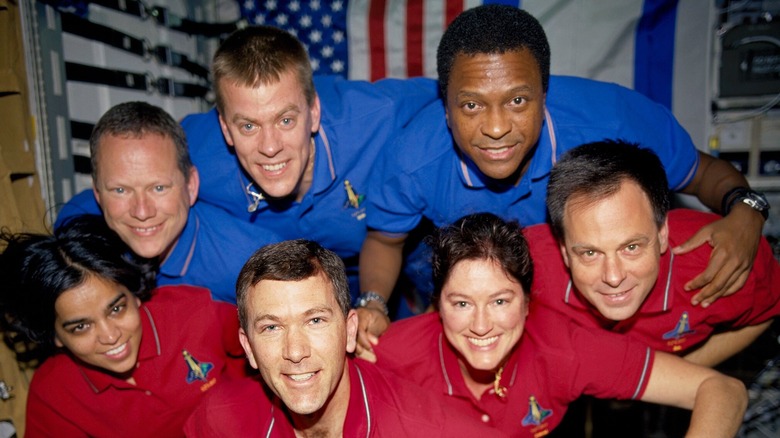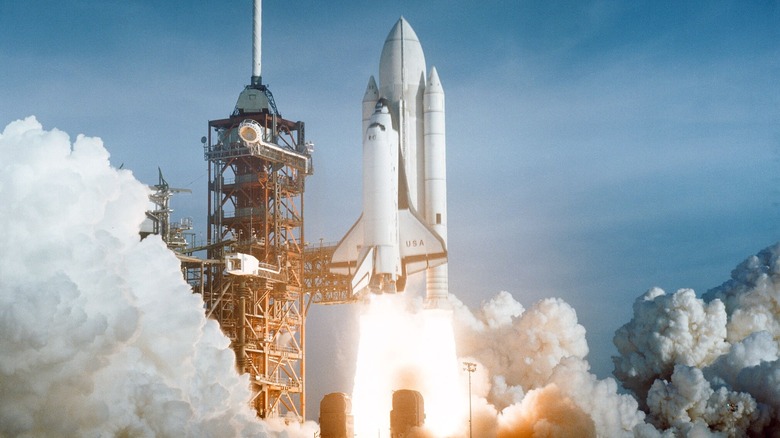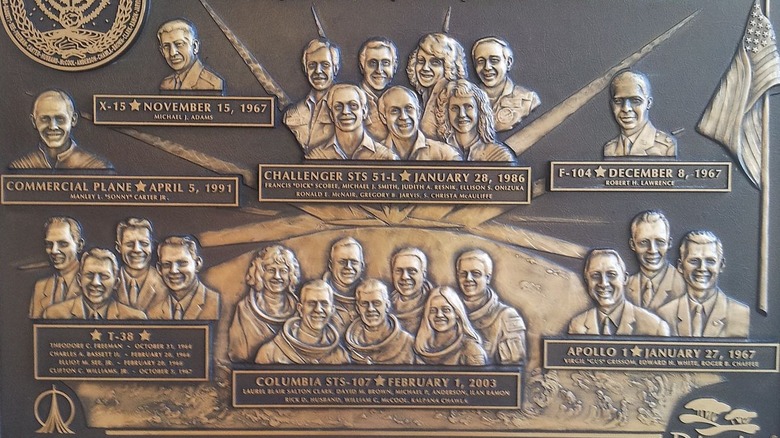These Were The Final Words Of The Space Shuttle Columbia's Crew
The 2003 Columbia disaster was the last space-related catastrophe of its type. Unlike the 1986 Challenger disaster, Columbia's seven-person crew — David M. Brown, Rick D. Husband, Laurel B. Clark, Kalpana Chawla, Michael P. Anderson, William C. "Willie" McCool, and Ilan Ramon — made it to space just fine. Their research-based mission was a success, and they were a mere 16 minutes away from touching down on Earth when their shuttle tore apart. Those onboard almost certainly died on the way to the ground.
During liftoff, a piece of the shuttle's insulation foam had broken off and struck its left wing. NASA told the crew not to worry, and then the wing ripped off during reentry. Five years later in 2008 NASA released a comprehensive, 400-page report from the investigation into the tragedy, and it outlined 30 safety and procedural recommendations for future missions. Just three years later in 2001, NASA retired its shuttle fleet.
Out of all of the Columbia's crew members, Commander Husband was the only one involved in a final conversation with NASA. In response to a call from mission control about odd thermal readings on the shuttle, Husband's last words were, "Roger, uh," or, "Roger, buh," before communications went dark. Beyond this, we have video footage of Columbia's last routine check before attempting reentry. And perhaps most importantly, we have messages that crew members logged during their mission, often describing the majesty of space and the immensity of being there.
[Featured image by NASA via Wikipedia | Cropped and scaled]
Final moments and footage
Like any other spacecraft, the Columbia had to conduct a series of "nominal entry preparation" tasks before heading back to Earth, as previous Columbia mission commander Scott Altman describes in an archived Associated Press video. At 500,000 feet above the Pacific Ocean crew members check clipboards, review instruments, put on gloves, and so forth. They converse amongst themselves for about 13 minutes before audio and video feed cuts out. Willie McCool, Kalpana Chawla, and Laurel Clark are in the video, and it's the last time anyone on Earth ever saw them or heard them speak. Commander Rick Husband shows up in the video, as well, and he alone would go on to represent the Columbia in its final minutes.
Sometime after the video ended and 23 minutes before Columbia was supposed to touch down, folks at NASA began to notice odd thermal readings coming from the craft. Maintenance, mechanical, arm and crew Systems (MMACS) officer Jeff Kling, entry flight director LeRoy Cain, and others contacted the Columbia to get more information. As we can see in a transcript of these conversations on CBS News, Husband calmly states, "We're checking that. We've got the flight controller power on. We're working through the rest of it as well. Thanks." After a couple more exchanges, NASA points out that the Columbia looks like it's lost pressure in both of its tires. To this, Husband merely replies, "And Houston, roger, buh," before dropping out. That's the last anyone heard from the Columbia.
[Featured image by NASA via Wikimedia Commons| Cropped and scaled]
Messages from the lost
The crew of the Columbia enshrined their experiences in messages they wrote while in space. Universe Today recounts Laurel Clark's final email to her family, where she talks about some everyday things like eating in space, her worsening eyesight, and "doing science round the clock." And because it's worth quoting at length, she beautifully writes, "I have seen some incredible sights: lightning spreading over the Pacific, the Aurora Australis lighting up the entire visible horizon with the cityglow of Australia below, the crescent moon setting over the limb of the Earth, the vast plains of Africa and the dunes on Cape Horn, rivers breaking through tall mountain passes, the scars of humanity ..."
Writer Marianne Dyson also compiles numerous quotes from crew members before and during their mission, as well as statements from family members and friends. Willie McCool, for instance, wrote from orbit, "The colors are stunning. In a single view, I see — looking out at the edge of the earth: red at the horizon line, blending to orange and yellow, followed by a thin white line." David Brown wrote, "If I'd been born in space, I would desire to visit the beautiful Earth more than to visit space. It's a wonderful planet." As they flew over Israel, Israeli-born Ilan Ramon wrote, "The quiet that envelops space makes the beauty even more powerful, and I only hope that the quiet can one day spread to my country." Such words speak better than this article, or any other, could.
[Featured image by Simiprof via Wikimedia Commons| Cropped and scaled | CC BY-SA 4.0 DEED]


